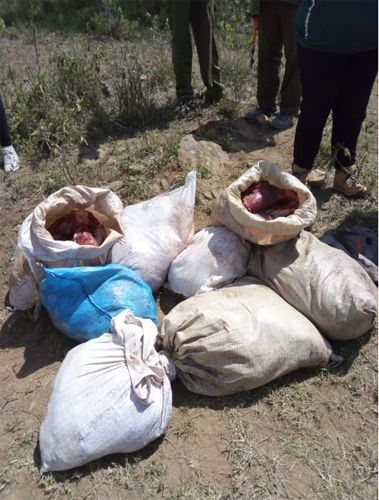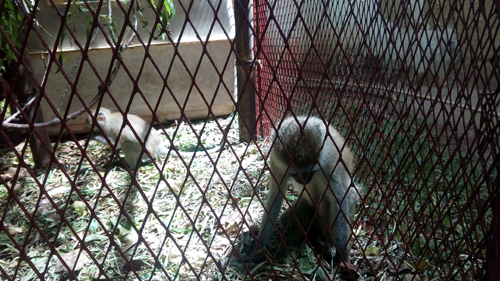A man identified as Samuel Gitome from Nakuru County on 22nd November, 2018 arraigned in court and charged for being in possession of zebra meat contrary to the Wildlife Conservation Act. Appearing before Chief Magistrate Josephat Kalo, Mr. Gitome was charged for possession of zebra meat weighing 208 kilograms worth Ksh. 83,200 found on 21st November 2018 at Soysambu Ranch in Mabruk, Nakuru County.
 The suspect was charged together with others who were not before the court but he denied the charges and pleaded to be released on reasonable bond terms claiming that he was framed in the matter. The other suspects managed to escape leaving behind two motorbikes and eight manila bags stashed with 208 kilograms of zebra meat which was believed to be ferried to butcheries in Gilgil and Nakuru towns and sold to unsuspecting customers as there is huge demand for meat during the festive season.
The suspect was charged together with others who were not before the court but he denied the charges and pleaded to be released on reasonable bond terms claiming that he was framed in the matter. The other suspects managed to escape leaving behind two motorbikes and eight manila bags stashed with 208 kilograms of zebra meat which was believed to be ferried to butcheries in Gilgil and Nakuru towns and sold to unsuspecting customers as there is huge demand for meat during the festive season.
According to the court hearing, the man was found in possession of the meat by the Kenya Wildlife Service (KWS) officers who were patrolling on a desnaring mission with Africa Network For Animal Welfare (ANAW) team, Project Abroad Volunteers and Soysambu Conversancy Rangers.
The accused was unable to produce documents permitting him to have game meat forcing the officers to make the arrest. The magistrate, in his ruling, released the accused on a Ksh. 1 million bond or an alternative cash bail of Ksh. 500,000 pending mention of the matter on Friday 30th November, 2018.
The news of China ending its 25 year ban rhino horn trade came as a blow to Kifaru Primary School pupils and staff in Nairobi's Umoja Estate, a school that prides itself on working to save the mighty herbivorous mammals as ambassadors for the endangered rhino or kifaru in Swahili that are native to Africa and some parts of Asia.
"It's the wrong step towards the environment. Rhinos are rare animals in most countries in Africa and the world at large. If we keep on poaching rhinos then the next generation will have nothing," Moses Kuol Malual, a former pupil at Kifaru Primary told DW.
"Most countries in Africa depend on tourism for their income."
In 2011, environmental activist Sam Dindi began working to raise awareness at schools in Nairobi and Kisumu, a port city on Lake Victoria, about the plight of the endangered species.
Dindi found Kifaru Primary a perfect model for his rhino education platform because of its name. "I first began by taking the students to Nairobi National Park. This is because some of the students had never seen a real rhino," Dindi says.
"I told them to be ambassadors of the animal when they return to school. They now understand what a rhino is and its importance."
Three of the five species of rhino are listed as critically endangered. Their numbers have been decimated by the poachers who are after rhino horn, which is used in traditional Chinese medicine or as a supposed aphrodisiac.
Rhino numbers declined in Africa during colonial times, when the animals were hunted for sport and meat. The demand for rhino horn has since shifted to Asia and the Middle East, where one kilogram can fetch up to $60,000 (€52,700) (Ksh. 6,211,800) on the black market.
In a policy directive on October 29th, the Chinese government said it would allow the use of rhino horn and tiger bones for "medical research" or "healing." The horn would have to be sourced from rhino raised in captivity, excluding zoos, it noted.
Beijing's lifting of the ban could roll back efforts to save the animals, the Kenyan government and wildlife conservationists have warned.
International trade in rhino horn has been illegal since 1977 under the Convention on International Trade in Endangered Species of Fauna and Flora (CITES).
"The pronouncement of China is against the international goodwill to protect endangered species," said Kahindi Lekalhaile, Director for Public Affairs at the Africa Network for Animal Welfare (ANAW).
"Banning the trade of the rhino horn both domestically and internationally was appropriate as a precautionary principle to avert the extinction of any remaining species of rhino in the world."
Lekalhaile warned the move could "actually trigger a poaching spark in Africa and Asian countries."
 Writer: Joseph Wangui
Writer: Joseph Wangui
Publication: The Daily Nation
Date: June 24, 2018
Tourism CS Najib Balala has revoked the appointment of Kenya Wildlife Service (KWS) board boss, John Waithaka, as the chair of a taskforce evaluating the possibility of allowing Kenyans to consume game meat.
Mr. Waithaka was replaced with Mr. Ben Ouma Okita, the Deputy Chair of the African Rhino Specialist Group and a board member of the Conservation Alliance of Kenya (CAK).
He is also the head of monitoring at Save The Elephants (STE). He will oversee finalizing of the report and review of policy and legislative framework relating to consumptive wildlife utilization.
The team is assessing the potential and economic benefits of consumptive wildlife utilization programs in contributing to improved food security, job creation and livelihood support.
 Writer: Ndungu Gachane.
Writer: Ndungu Gachane.
Publication: The Daily Nation
Date: June 11, 2018
Kandara division police boss Wilson Kosgey said that they are pursuing a gang that has been dealing in stolen cows in the area.
According to the police boss, the gang comprises two guards, a matatu operator and a butcher. The matatu owner is believed to provide the get-away vehicle while the butcher distributes meat from the stolen animals. Police believe the cows were being transported to Murang’a where it is suspected to be the home of a black market for stolen animals.
Not only are the cows being sold for meat, it is suspected that some are sold to unsuspecting dairy farmers. Kieni East police boss Job Lesikinwa said that detectives are probing cases of livestock theft in the area as they pursue masterminds of the thefts.